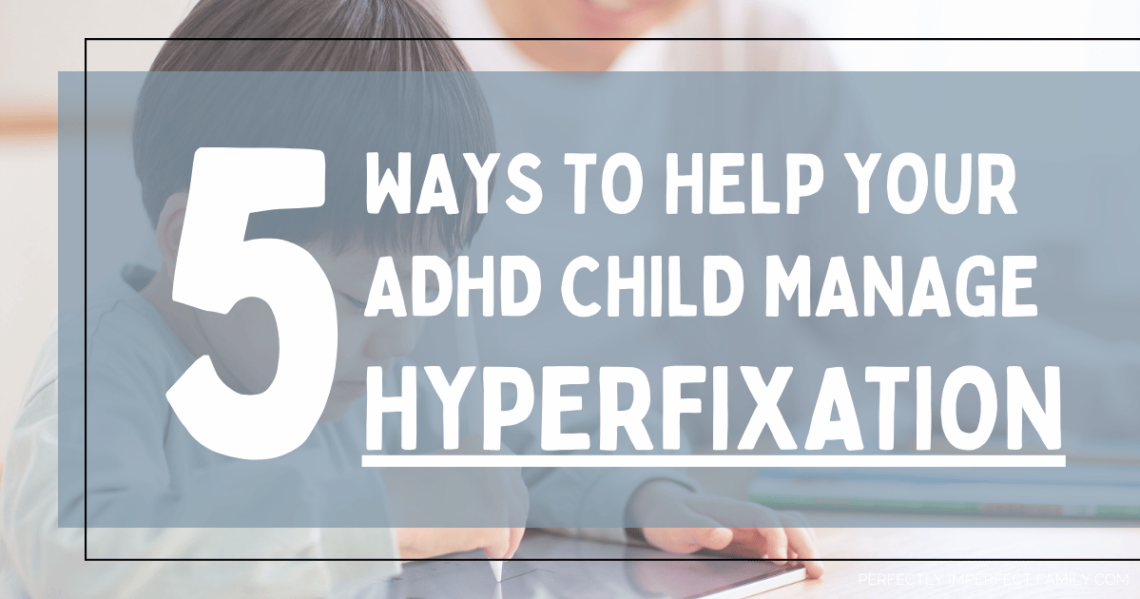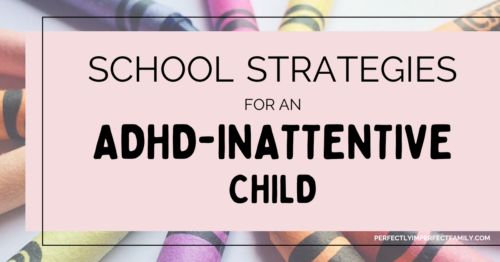
5 Ways to Help Your ADHD Child Manage Hyperfixation
If you have been reading along with my posts on Perfectly Imperfect Family, then you have learned a little bit about my son and how he was diagnosed with Inattentive ADHD at a young age.
Inattentive ADHD means my son gets distracted easily and has a hard time paying attention for an extended period of time. This affects him at home and at school. Because our son doesn’t have the hyperactivity with his diagnosis, my experience is with inattentive ADHD.
But there’s something about ADHD that rarely gets discussed, regardless of the subtype, and that is hyperfixation. This is the one thing that I find that we battle over all the time, read Our Son’s Challenges With Hyperfixation. Do your kids with ADHD ever hyperfixate on something?
Hyperfixation is when you concentrate intently on something. Anyone can hyperfixate, including adults. My son hyperfixates, and he tends to hyperfixate on video gaming. As you can imagine, electronics have been a problem for my kids, and it tends to be even worse for my son.
He’ll start gaming and completely lose track of time. Before we realize it, hours have slipped by. To be fair, the gaming itself isn’t always bad. He dreams of becoming a pilot, and the games he plays often align with that interest. But I’m not saying it’s okay for him to game for hours just because it’s pilot-related. I do appreciate that he chooses those games over more violent ones.
Over the years, I have found ways to help him and me with his hyperfixation. Here are some ideas that have helped us.
5 Ways to Help with Hyperfixation
1. Talk to Your Child
Talking to your child about hyperfixation is essential. Explain what it is and how it affects them and the rest of the family. Help your child understand that hyperfixating can cause them to lose track of time and that hours can pass before they even realize it. Emphasize that taking breaks is healthy and necessary. My son will lose track of time easily, and we’re constantly having this conversation.
This isn’t a one-time conversation. I find myself explaining it to my son repeatedly. Reminders are part of the process, and we have constant reminders in my family, so be prepared to revisit the discussion often.
2. Involve Them in Rule-Making
Work together with your child to develop some ground rules. I find that if they help come up with rules on when and for how long they can do spend on their activities, they tend to stick to the rules better than if you tell them what the rules are.
If one rule isn’t working, sit down with them again and devise a different one. Don’t be afraid of throwing out rules that aren’t working. In my experience, as your child gets older, these rules will constantly change. The goal is to find a set of rules that you’re comfortable with as a parent, and that your child can follow.
Some rules to consider: setting time limits, completing chores before their activity, or ensuring homework is done. Make the rules to fit your child’s and household’s needs.
3. Setting a Time Limit
It is not always easy, but try to set a time limit on what they are hyperfixating on. This can be the most difficult for your child to follow because they easily lose track of time. If you have come up with a specific time, you and your child need to stick with that time. Can they earn extra time? Absolutely! If they have not earned extra time, stick with the original time.
Sometimes, kids can be sneaky and return to their hyperfixation without you knowing. So be aware of this! My son likes to sneak away from activities or doing chores around the house without me knowing, and I always find him back on his game, and I need to get him back on task.
One piece of advice I have found that works well is to warn your child that their time is almost up. This can be much less stressful than making them stop their activity in the middle of whatever they are doing. If you give them warnings, it is easier for them to find a place to stop.
4. Distraction
Distraction is a tremendous way to get their minds off the activity they like to hyperfixate on. Distracting them with chores is a good way to get them to do other things. Even if they have done chores they were supposed to do before their activity; there are always chores that need to be done. Get them involved with new tasks.
Family time or family activities can be their number one distraction. They can go on a bike ride or a walk, play basketball in the driveway, or do a craft project. The best way to have them do this is for the whole family to do it together. This is a double win because you get family time together, and they are not hyperfixating on anything.
5. Eating Dinner Without Electronics
Try to establish a routine where your child steps away from their activity to join you for dinner without any distractions. It’s a valuable opportunity for interaction and conversation. I find engaging them in conversation around the dinner table can lead to some incredible conversations and fun moments.
I know this one can be hard to do every single day. Life gets busy and things come up. However, this can get them into a habit of eating dinner without any electronics. Hopefully in the long run this will just become a habit.
Learning to Manage Hyperfixation
Now that my son is in his teenage years I have discovered that his hyperfixation on certain activities does not go away, and it gets harder as he gets older. Help your child learn how to deal with hyperfixation as it will always be a part of their lives. Having a strategy in place will help.
Do we use these strategies perfectly every day? No. We’re not perfect, but we try our best.
I hope some of these strategies can help you and your child navigate hyperfixation. For those of you facing similar challenges, do you have any tips or methods that work for you? I’d love to hear your thoughts in the comments!





